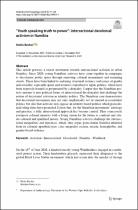“Youth speaking truth to power”: Intersectional decolonial activism in Namibia
Abstract
This article portrays a recent movement towards intersectional activism in urban
Namibia. Since 2020, young Namibian activists have come together in campaigns
to decolonize public space through removing colonial monuments and renaming
streets. These have been linked to enduring structural violence and issues of gender
and sexuality, especially queer and women’s reproductive rights politics, which have
been expressly framed as perpetuated by coloniality. I argue that the Namibian protests
amount to new political forms of intersectional decoloniality that challenge the
notion of decolonial activism as identity politics. The Namibian case demonstrates
that decolonial movements may not only emphatically not be steeped in essentialist
politics but also that activists may oppose an identity-based politics which postcolonial
ruling elites have promoted. I show that, for the Namibian movements’ ideology
and practice, a fully intersectional approach has become central.

